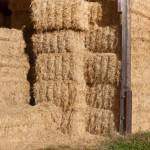Horse Diets: Getting the Most from Lower Quality Forage

Not all horses have access to or require top-quality forage at all times of the year. For example, hay shortages during drought and natural disasters often limit forage availability, requiring creative feeding solutions. In addition, certain horses, such as those with equine asthma or equine metabolic syndrome, benefit from nontraditional forages such as wheat straw.
“Wheat straw is an agricultural by-product with high fiber and low dust but also low nutritional value. It can be a blessing if no other forage alternatives exist or if the low digestibility benefits the horse,” advised Kathleen Crandell, Ph.D., a nutritionist for Kentucky Equine Research.
For horses with equine metabolic syndrome, the low nutritional value of wheat straw is desirable to facilitate weight loss. But what about horses that need to maximize the available nutrients from wheat straw?
“A recent in-vitro study shows that the digestibility of wheat straw can be increased through the work of specific hindgut bacteria that specialize in breaking down cellulose, thereby potentially enhancing its nutritional value,” Crandell said.
“This was, however, a laboratory study, and these findings must be confirmed in a real-life setting,” she added. “Straw is not an unusual forage choice. In many countries, straw is fed to high-performance horses to give them more chewing time, but this is usually in addition to high-quality forage and concentrate.”
Considering the volume of agricultural by-products with low nutritional value produced each year, maximizing the use of these products, which extends far beyond wheat straw, benefits everyone.
For more information on finding hay during times of need, contact your local extension specialist. To learn how to integrate wheat straw into your horse’s diet, especially those with equine metabolic syndrome, contact a Kentucky Equine Research nutrition advisor today!
Horses fed only forages require a source of vitamins and minerals to round out the nutritional profile of their diets. Micro-Max is a low-intake, concentrated source of vital nutrients and is appropriate for horses with metabolic diseases. Australian horse owners should look for Gold Pellet, Nutrequin, Perform, or All-Phase to provide high-quality vitamin and mineral supplementation.
*Harsini Shakarami, M., T. Mohammadabadi, H. Motamedi, et al. Isolation and identification of cellulolytic bacteria from gastrointestinal tract of Arabian horse and investigation of their effect on the nutritional value of wheat straw. Journal of Applied Microbiology 127:344-353.








